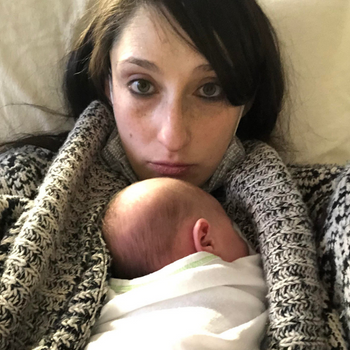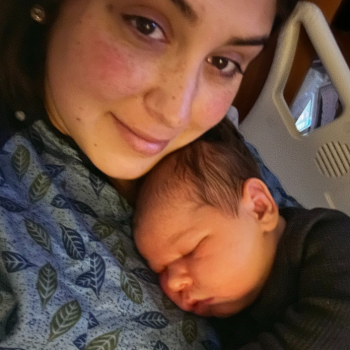
Postpartum Preeclampsia Led to Postpartum Depression
March 20, 2023 By Ilana Dimbleby

I had postpartum hypertension with both of my pregnancies. With my first pregnancy, I had a subchorionic hematoma hemorrhage at 11 weeks, which left me on bed rest for a few weeks. After that, my pregnancy mostly progressed normally. I continued to enjoy my life in Manhattan, went to my regular spin classes, prenatal yoga, and the gym almost daily. Overall, my baby was measuring small throughout. At first, no one was worried. However, at my 35 week scan, I was told my baby was very small, in the 5% for size, and did a stress test, which came back normal. I was asked to come back to MFM in a week to check on the baby again. At that time, at 36 weeks + 5 days, I learned the baby hadn’t grown at all. The MFM doctor said she’d talk to my OB but they’d recommend delivering as soon as possible given the growth restriction. I left the hospital confused and worried, and got on the subway downtown back to the office. Within 45 minutes of that MFM appointment, my OB called to tell me we’d be delivering my baby by c-section (she was also breech, so this was planned!) at 37 weeks. Fast forward to the morning of the delivery, and my blood pressures were reading high in pre-op. The PA asked if I’d been having high blood pressure, and I had said no, I don’t think so. So the C-section proceeded as normal, and before we knew it, my baby girl was in the world. I got to hold her for what felt like just a second, as she was whisked away to the NICU for being under 5lbs and having low blood sugar. I had been recovering normally, until about 36 hours after delivery when my blood pressure started to go up. My wonderful postpartum nurse started to get concerned, and tried all the things to help it go down. After waiting 30 minutes, she came back to take my BP again when it skyrocketed dangerously. At that moment, things got real. She called for a resident on her walkie talkie. She desperately tried to get an IV back in my arm (after having taken it out just a few hours before), and had to have back up to do so. Before I knew it, there was a resident, PA, and my postpartum nurse in the room. Quickly, the resident got the IV in my hand (OUCH) and almost immediately pushed in a fast-acting medication that left me feeling freezing cold but that brought my BP down right away. I learned later, after many blood tests, that all of my organ function was normal, all of my other counts were normal. I started feeling scared, worried, and sad as my baby was also separated from me in the NICU. Over the next few days, my doctors closely monitored my blood pressure and I was seen by the chairs of my hospital’s Nephrology department. Experts in their field, they gave me great care. I was not allowed to leave the hospital until, after walking around for 20 minutes, my BP was no higher than 140/100. By this time, my baby was out of the NICU and I was attempting to care for her (with my husband by my side) all while trying to take care of myself. By day 5, I was finally discharged, sent home with an arsenal of BP medications to take 5 times a day, and orders for a home health nurse and follow up appointments with my nephrologists from the hospital. Eventually, I recovered fully and was able to go off all medications after 6 months. My baby girl’s outcomes were mixed at first - she was tiny and had a hard time feeding. It wasn’t until she was about 18 months that she finally made it on the growth chart, and she’s caught up and then some since.
After this experience, I was so shocked by my experience, the entire saga of my baby going to the NICU, being in the hospital for 5 days, and leaving with an arsenal of extremely strong blood pressure meds. Being preemie and tiny, my baby had feeding issues right away. It all caused me to spiral into postpartum anxiety that was at first hard to recognize. I felt so unlike myself; I was scared about my own health, while also trying to figure out how to keep a baby alive. I rapidly lost weight from not eating and pumping. I worried and stressed and worried and stressed. Going back to work and going to therapy helped me get through it, but I learned not to be ashamed of my mental struggles, to not blame myself for what happened, to seek help and be open when things feel too much.
My second pregnancy was completely normal, and I took a baby aspirin every day to stave off any growth restriction this time. I carried up until 39 weeks +5, and had my scheduled C-Section. I had a perfectly sized, completely healthy baby girl. But like clockwork, my BP again started to rise after delivery, just as it did the first time. This time around though, I was put on a magnesium drip. As I was being wheeled to the recovery room, and as I sat there in the bed, I began to cry, so upset that this was happening to me again. I was devastated to be separated from my baby. I was confused as to why me; I had again stayed fit throughout my entire pregnancy, exercising every day. I called my mom and cried to her, so sad and scared all over again. The magnesium was absolutely awful, and I felt awful, like I was overdosing on cough medicine; I was unable to care for my baby, get out of bed, or keep my eyes open. After almost the full 24 hours, they took me off the mag as my BP was stabilizing and they determined the dosage was way too high for my size. Unfortunately, within hours, my BP started to go up again. From there, I had to stay in the hospital for another 3 days while the doctors tried to figure out what meds would work. I even shared, milligram for milligram, what I went home on last time. I shared my doctors’ names from my last delivery (but given it was a different hospital system, they couldn’t get my records!) in case it would help. All the while, I felt totally fine, no physical symptoms to speak of. Finally, after 6 full days, I was discharged and able to go home. I left on the same battery of medications. I quickly scaled back at home as my BP plummeted and I began feeling dizzy. After seeing a local nephrologist a few times, we determined a steady BP medication to stay on. The second time around, I didn’t have the same kind of anxiety because, frankly, I’d been through it all before and my baby didn't have any of her own health concerns. I was able to handle the treatment calmly and launch into being a mom-of-two with that experience under my belt. But my perspective was changed forever in that I came to understand my own vulnerability to the mysteries of biology and science, and that it’s ok to not be ok, and that in the end, we’re all stronger than we know.
Overall, I am so grateful for the care I received in the top-notch hospitals where I delivered. I greatly understand the privilege in my experience -- there were no barriers to me getting the care I needed to have positive outcomes. I have a terrific employer that gave me generous leave so I could recover fully, both times. And health benefits that afforded me the medical care, medications, therapy, and other services at almost no out-of-pocket cost that were pivotal in my overall health and well being. This isn’t the case for so many women in this country, and my experience with maternal care myself has given me the perspective that we need to do better for all women, no matter where you come from, give birth, are employed, and so forth.
One of the biggest changes for me is that I’m still on blood pressure medication, 2 years after my second pregnancy. I’m an avid exerciser 5 - 6 days a week, a healthy eater, non-smoker, and only social drinker. But something in my body changed after preeclampsia, so despite my healthy lifestyle and body weight, I still have a hypertension disorder. It makes my commitment to my health even more important to me. It makes me realize the body is complex, genetics are complex, and it’s my responsibility to care for myself so I can make the most of my life and be the best mother I can be. I hope by sharing my story I can help advance preeclampsia research and help other women in their own journeys.
My story was able to help my twin sister through her pregnancy - you can read her story here.

My perfect daughter, Katie, gave birth to her first child just eight days before she passed away due to postpartum complications. Her deliver...
ReadMore- My Hellp Syndrome Birth Story: Idaho Falls Promise Walk Mission Mom March 06, 2025
- Listen To Your Body March 03, 2025
- Hellp Syndrome and Kidney Failure: Taking Nothing For Granted February 28, 2025
- Surviving Preeclampsia February 28, 2025
- A Survivor’s Story: Twice the Battle, Twice the Victory February 28, 2025
- Postpartum Preeclampsia X2 February 28, 2025
- Surprise Postpartum Preeclampsia February 28, 2025
- My Postpartum Preeclampsia Experience February 22, 2025
- Cryptic Pregnancy and Emergency C-Section February 22, 2025
- Strong Like Smartie February 22, 2025
